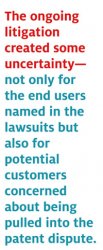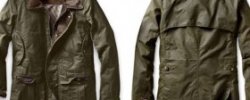 The regards to the offer have not been revealed, but RFID Journal features learned that merchants who have been sued by Round Rock analysis will likely to be provided a period of time to conform to the settlement terms. This implies stores will have to make use of increased percentage—our supply would not reveal the number—of visitors from Motorola and tags from Smartrac (alongside RFID sellers, if more settle). Stores utilizing RFID for the first time will be exempt from legal actions by Round Rock when they utilize the same percentage of licensed RFID technology.
The regards to the offer have not been revealed, but RFID Journal features learned that merchants who have been sued by Round Rock analysis will likely to be provided a period of time to conform to the settlement terms. This implies stores will have to make use of increased percentage—our supply would not reveal the number—of visitors from Motorola and tags from Smartrac (alongside RFID sellers, if more settle). Stores utilizing RFID for the first time will be exempt from legal actions by Round Rock when they utilize the same percentage of licensed RFID technology.
It is uncommon for just two businesses to announce separate agreements collectively. The reason Motorola and Smartrac each issued a pr release stating both businesses had settled concurrently with Round Rock is underneath the Round Rock suit, an "RFID system" consists of tags and readers, so Motorola could not settle alone. And retailers wouldn't move ahead with deployments when they could use accredited visitors yet not certified tags.
The offer is likely to impact RFID adoption—but before we explore that, let's talk about the background. Round Rock scientific studies are a patent-licensing firm with several thousand patents and pending programs. The organization does not manufacture, sell or promote any products or services. As an alternative, it works as a non-practicing entity (NPE), or what exactly is sometimes called a "patent-assertion entity" (PAE) or "patent troll, " earning income exclusively by licensing and implementing its patents.On Dec. 14, 2011, the Mount Kisco, N.Y., company filed legal actions against nine companies utilizing passive UHF RFID items given by Motorola, Smartrac along with other RFID sellers, charging you your solutions infringed on five of Round Rock's RFID patents given because of the U.S. Patent and Trademark workplace. Those businesses were US Apparel, Dole Food, Fruit associated with Loom, space, HanesBrands, JC Penney, Macy's Retail Holdings, PepsiCo and VF Corp.
A week later, Round Rock filed a similar lawsuit against Amazon, claiming the online business infringed on nine Round Rock U.S. RFID patents. In March 2012, the business included Walmart to its a number of defendants, saying the retailer violated 10 of Round Rock's U.S. RFID patents. Throughout 11 lawsuits, Round Rock asked so it be awarded problems adequate to pay for so-called infringement, that these types of problems be decided by a jury and stay trebled, with interest, and therefore it be reimbursed because of its appropriate expenses.











